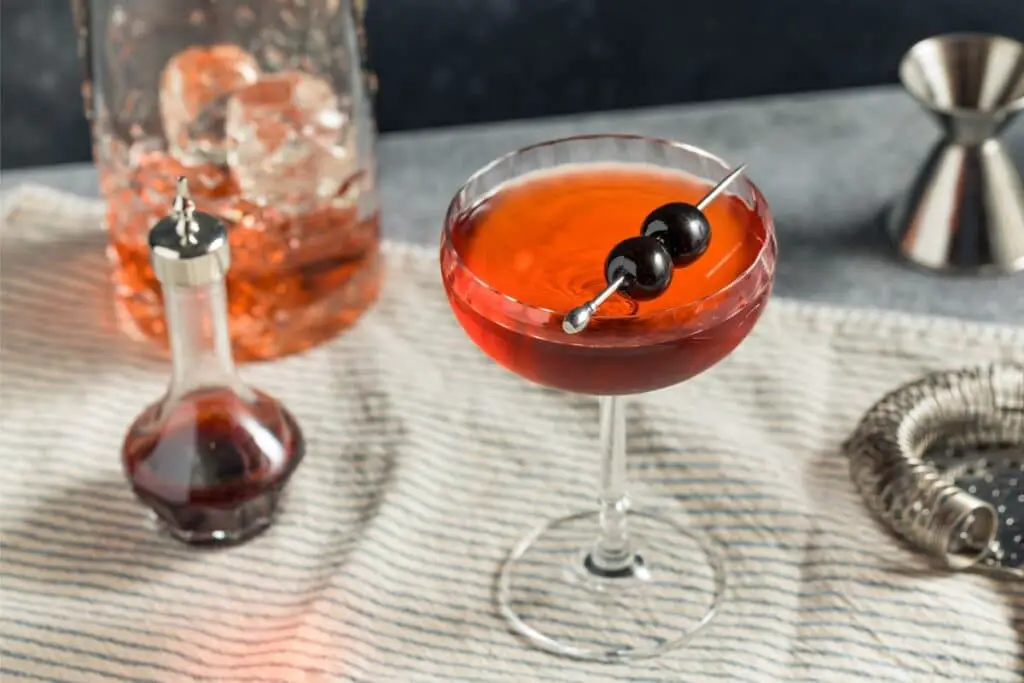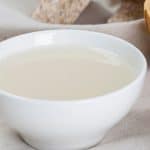Quick summary: Sweet or dry red wine, sherry, port, Amaro Averna, or Sweet Madeira will be excellent alternatives to sweet vermouth, while Lillet, sake, or white wine can replace dry vermouth.
Vermouth is wonderfully versatile. From cooking and drinking neat to making cocktails, it’s a wonderful bar staple to ensure you’re prepared for any occasion.
If you’ve just poured the last drop and need to keep the cocktails going, we’re here to help you out. In this guide, we list the best vermouth substitutes and help you choose the best option according to what you are using it for.
Before we get into the replacement options, let’s look at the different types of vermouth, their uses, and things to consider when choosing the best vermouth substitute.
What Is Vermouth?
Vermouth is different from regular wine since it is fortified with additional flavors. This means that the wine base has been infused with aromatic herbs, spices, and botanicals.
When it comes to the taste, expect notes of cloves, citrus peel, cinnamon, quinine, cardamom, cocoa, caramel, and marjoram with a hint of bitterness.
Vermouth has an alcohol by volume (ABV) content slightly higher than other types of wine at 16% to 18%.
In the same way that you get different types of wine (red, white, sweet, semi-sweet, and dry) you also get different types of vermouth. The two main categories are sweet (or red) and dry (or white) vermouth.
Read more on vermouth shelf life and how to store it best.
Sweet Vermouth vs Dry Vermouth
Sweet vermouth has earthy and spicy flavor notes.while it is not excessively sweet, it does have a much higher sugar content than the dry type.
The sweet type is popularly used in cocktails such as the Manhattan, Negroni, and Americano.
The dry type has a crisp, dry flavor, light color, and is a classic ingredient in martinis.
How to Choose a Substitute for Vermouth
When looking for the most suitable substitute you’ll want to consider what flavors are important in the drink or dish you are making.
If you are cooking savory dishes or making martinis, you will want to avoid overly sweet wines or juices. On the other hand, if you are looking for lots of herbal and citrusy flavors, liqueurs or amaro will be a better choice.
Check the ingredients label of the replacement you are using and give it a taste before adding it to determine that the flavors are compatible.
Below we’ll give you advice on the best substitutes for dry and sweet vermouth as well as some hacks to get a closer flavor match.
Best Substitutes for Sweet Vermouth
Sweet Red Wine
Sweet reds have an earthy taste with notes of spice, red or black fruits, botanicals, and herbs. They can be used to replace sweet vermouth in sweet and savory dishes as well as mixed drinks in equal quantities.
They pair especially well with smoked meats, soft cheese, and desserts.
Dry Red Wine
Dry red wine can be used as a replacement for drinking or cooking in equal quantities. Since there are a wide variety of dry reds to choose from, the flavor of your dish or drink may differ slightly depending on the specific type that you choose.
This is a great vermouth substitute when cooking stews, braised beef, lamb, pork, marinades, sauces, and glazes. It can also be used in desserts and sweetened with a little simple syrup.
Sherry
Whether you’re cooking or making cocktails, dry sherry is a good substitute and can be used in equal quantities. There are many different types, so if you are particular about getting a near-exact flavor match be sure to read the label and taste before adding it to a mixed drink or recipe.
Sherry in general has a flavor profile of dried fruits and nutty undertones and works well with meat, seafood dishes, olives, almonds, cheese, and rice pudding.
Sherry is not as sweet as vermouth but adds a great depth of flavor and is a versatile option to keep in the pantry.
Port
Port wine is also a fortified wine with raspberry, blackberry, cinnamon, chocolate, and caramel flavor profiles depending on the variety. Port is a sweet wine and pairs very well with chocolate and caramel desserts, soft cheese, stone fruit, berries, salted nuts, and smoked meats.
White port is the best choice as a replacement in cocktails while tawny and ruby port make a good vermouth substitute in cooked dishes such as stews, marinades, sauces, casseroles, and desserts.
Use port as a replacement in equal quantities. If you find that it makes your sauce or stew sweeter than intended, add a squeeze of lemon juice to balance it out.
Amaro Averna
Amaro Averna is an Italian bittersweet herbal liqueur. It is mostly enjoyed neat or on ice as a digestif and used in classic cocktails such as the Black Manhattan.
It has a prominent citrus flavor as well as hints of caramel, anise, sage, myrtle, and juniper berries. We recommend this mainly as a replacement in cocktails and drinks.
Although it can be used in cooking, sherry, port, or red wine are better options for cooked dishes.
While Amaro Averna can be replaced in equal quantities, keep in mind that it has an ABV of 29% which is significantly higher than that of vermouth.
Sweet Madeira
Also a fortified wine, Sweet Madeira has a rich, nutty flavor with hints of caramel, brown sugar, and honey. It is mainly enjoyed as a dessert wine or served as an after-dinner drink (digestif).
It pairs really well with blue cheese, dried fruit, poached pears, chocolate, and pastries with nuts, berries, and honey.
You can use it as a replacement in equal measures. If you are cooking savory recipes or making cocktails, be mindful of how the sweetness and richness will pair with other flavors in your recipe.
Best Non-Alcoholic Sweet Vermouth Substitutes
Red Wine Vinegar
The next two options are suitable as a substitute in cooking only and not for drinks. Red wine vinegar has an acidic taste but also a slightly sweet flavor which makes it great in marinades, dressings, and sauces.
Due to the sour taste and acidic punch you’ll want to dilute it when adding it to a recipe. Mix 1/3 cup of red wine vinegar with 2/3 cup of water to replace one cup of sweet vermouth.
Balsamic Vinegar
Balsamic vinegar is made from fermented grapes which gives it a sweet yet acidic flavor with great richness. Authentic balsamic has a thick, syrupy consistency while many commercialized products have a thin consistency and lower sweetness.
As with red wine vinegar, mix 1/3 cup of balsamic with 2/3 cup of water to replace one cup of red vermouth. It works well in risotto, marinades, vegetable dishes, salad dressings, and even in some dessert recipes.
Red Grape juice
Grape juice is a lot sweeter and also lacks the spice notes, however, it can still be used in small amounts in marinades, sauces, and desserts.
When using regular grape juice as a sweet vermouth substitute, use only half the amount called for in your recipe and add a few drops of lemon juice if you still find it too sweet.
Best Dry Vermouth Substitutes
Lillet Blanc
This French fortified wine varies in taste according to the variety you choose. To replace dry vermouth, we recommend Lillet Blanc which features grape, herbal, and botanical notes.
Lillet Rose is fruitier with stone fruit, citrus, and honey flavors while Lillet Rouge has a strawberry preserve undertone.
It is generally served as an aperitif but is also a good option in cocktail recipes including Vesper Martini, Lillet G&T as well as spritzers.
Sherry
We’ve already mentioned sherry as a great substitute for red vermouth, but it can be used equally well as a dry vermouth replacement. There are two classes of sherry—one for drinking and one for cooking.
Cooking sherry is not suitable for drinking since it contains added preservatives and salt.
While drinking sherry is mainly for drinking, it can however be used when cooking as well, which makes it the more versatile option of the two.
When replacing dry vermouth, use dry sherry in equal quantities. You can serve it straight and use it as a replacement in martinis. When cooking, it pairs well with cheese, pork, chicken, and shellfish dishes.
Sake
Sake is a Japanese wine made during a complex process of rice fermentation. It lacks the crisp acidity of other wines but has a richness, slight sweetness, and fruity flavor with a similar ABV to vermouth.
This is another versatile substitute that can be used in cocktails and cooking in equal quantities. Use it to replace vermouth in a martini to make a ‘saketini’ with gin or vodka.
When cooking, it helps to tenderize meat which makes it a good option for marinades. It can also be used in sauces, soups, and desserts.
Usual sake has an indefinite shelf life, although some quality degradation might happen over the years. But this does not apply to unpasteurized sake, which can certainly go bad. Learn to know the difference to be sure.
White Wine
While you could use a variety of white wines as your substitute, we recommend Sauvignon Blanc as one of the best choices. It is a versatile option for cooking and drinking and is easy to find at an affordable price.
Dry white wine has the right amount of acidity with botanical notes which makes it a good choice for sauces, risotto, stews, and seafood recipes. You can also use it as a replacement in equal quantities in martinis.
White Wine Vinegar
Just as red wine vinegar is a good replacement for red vermouth, white wine vinegar can be used in cooking instead or white vermouth.
It works well in marinades, stews, and sauces. When using white wine vinegar, use only one third of the amount your recipe calls for.
If you only have apple cider vinegar, its fruity taste can work just as well in small quantities.
Lemon Juice
Fresh lemon juice provides acidity, citrus notes, and a slight bitter flavor which are all characteristics you are looking for. It is best used as a substitute in cooked dishes as opposed to drinks. Use only half the amount your recipe calls for.
If you are using bottled lemon juice as opposed to freshly squeezed, start with even less since it is more concentrated.
We don’t recommend using other citrus juices such as lime juice since these flavors can be overpowering.
Lemon juice duration will depend on whether you have a fresh or shelf-stable one.
FAQ
Can I use old wine or vermouth for cooking?
Yes, you can use old wine or vermouth for cooking. Both drinks can be used for cooking when they no longer taste as good as a newly opened bottle. This is a great way to use up old bottles.
Must I keep vermouth refrigerated after opening?
Yes, you must keep vermouth refrigerated after opening. Refrigerating it once opened will slow down the oxidation process which means the quality will stay better for longer.
How long is unopened vermouth good for?
Unopened vermouth is good for up to a year. A bottle that has not been opened can be kept at room temperature.
Conclusion
Whether you are looking for a sweet or dry vermouth substitute, there are a number of pantry staples you can grab in a pinch.
For cooking recipes, the best vermouth substitute is a similar fortified wine or cooking sherry. If you’re mixing an alcoholic beverage, try Lillet blanc, wine, or Amaro Averna.
When it comes to non-alcoholic options, grape juice (or apple juice), lemon juice, and wine vinegar can all be used. However, it is necessary to consider the distinct flavor of each one and adjust the ratios accordingly to prevent it from being overly sweet or acidic.
*image by bhofack2/depositphotos









